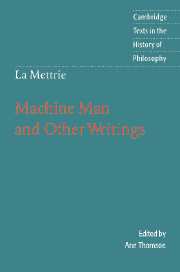Man as Plant
Published online by Cambridge University Press: 05 June 2012
Summary
Note on the text
L'Homme-plante first appeared in 1748, published by C. F. Voss in Potsdam. It contained a large number of notes, consisting mainly of references, which were all removed when the text was reworked in 1750 for inclusion in La Mettrie's Philosophical Works. Otherwise the changes were only slight. F. L. Rougier published an edition of the work (New York, Columbia University, 1936) giving the text of 1748, which is very rare. The present translation is based on the 1750 version.
Preface
Man is here metamorphosed into a plant, but do not think this is a fiction in the style of those of Ovid. A simple analogy between the vegetable kingdom and the animal kingdom has shown me that the main parts of the one are found in the other. If my imagination sometimes plays here, it is, so to speak, on the sounding board of truth; my field of battle is that of nature, whose variations I could have hidden from view, if I had not wanted to single myself out.
Chapter I
We are beginning to glimpse the uniformity of nature; these as yet still weak rays of light are due to the study of natural history. But how far does this uniformity go?
We should be careful not to push nature too far; it is not so uniform that it does not often stray from even its most favourite laws.
- Type
- Chapter
- Information
- La Mettrie: Machine Man and Other Writings , pp. 75 - 88Publisher: Cambridge University PressPrint publication year: 1996
- 4
- Cited by

